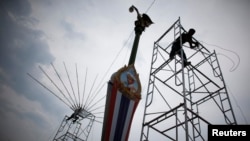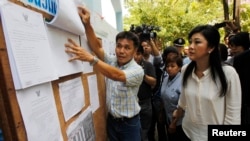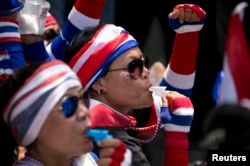BANGKOK —
Thailand’s embattled prime minister is facing new legal challenges that could force her from office. With no end in sight to the country’s months-long political deadlock, government supporters are planning a massive rally on the outskirts of the capital.
Since November, Thailand has been engulfed in political turmoil driven by anti-government protesters who have called for Prime Minister Yingluck Shinawatra to resign over allegations of corruption and abuse of power.
A February election failed to resolve the impasse. Protesters blocked voting in parts of Bangkok and elsewhere, saying that before holding elections, the country needs to be ruled by an unelected council that will implement political reforms. Courts have since ruled the February election invalid.
The prime minister's opponents have filed several court cases that could force her from office. In response, her party’s political base, led by the United Front for Democracy against Dictatorship or UDD, also known as Red Shirts, is planning a massive show of public support.
Tida Tawornseth, a senior UDD leader, says the weekend rally aims to "protect democracy."
"We still want to show the number of people and the feeling of the people who want to protect democracy. So we need a need a big number," she said. "I think maybe 400,000 to 500,000 to show the number of people and the feeling. We want to check the system, check the core leader at every level."
The court challenges could force Yingluck from office in the coming weeks. The National Anti-Corruption Commission (NACC) has charged the prime minister with negligence in overseeing a controversial rice price pledging scheme that analysts say was riddled with corruption.
In the past week the constitutional court accepted a petition against the Prime Minister over the transfer of a senior National Security Council official in 2011. An administrative court had earlier ruled the transfer unlawful. If the court finds against the Prime Minister she and her cabinet may be forced to resign.
If the Cabinet resigns the head of the senate can call for appointment of a neutral prime minister to oversee fresh elections. But red shirt leaders says such moves will be resisted.
Deep political divisions
Thailand's political divisions now run deep. The anti-government People's Democratic Reform Committee (PDRC) or "yellow shirts" draw support from urban middle class and southern provinces.
The Pheu Thai and its red shirt backers are largely in the north and northeast regions - from farmers to urban centers and including the poor, attracted by the party's populist policies under former leader, Thaksin Shinawatra. Thaksin lives in exile to avoid a jail term for corruption.
A stand-off has remained despite mediation efforts by academics, business and other groups. Now, with the judicial decisions pending, tensions again are growing.
The political violence, the worst since 2010 when 92 pro-Thaksin protesters and military died, has already led to the deaths of 24 people, including children.
Kraisak Choonhavan, a member of the Democrat Party and former senator, says as both sides appear unwilling to compromise, confrontation appears inevitable.
"If the red shirts would mobilize and come into the city and face-off with existing protesters of the PDRC it's inevitable it seems. I do have the feeling that the ruling of the constitutional court over the removal of the director of the National Security Council will have a special effect on the politics. The pro-government supporters would most likely confront the court like they have been doing in the past firing M79 [grenades] and all sorts of explosives at different courts," said
Kraisak Choonhavan.
Rally goers on Saturday have pledged not to resort to violence. They are expected to remain far from the downtown area, reducing the chance for clashes with anti-government demonstrators based in the city center. But observers worry that both pro- and anti-government militias have already stockpiled weapons in anticipation of violence.
Fear of violence
Despite pledges from leaders of both sides to remain peaceful, many including UDD core leader, Tida Tawornseth, are pessimistic.
"I think maybe it's very difficult for this country to avoid violent action. Very difficult. But for us we try the best to avoid violent we try to avoid confrontation with the PDRC just only to show the strong intention and the number of people," she said.
Chris Baker, an author and commentator on Thai politics, says once extreme views on both sides are set aside, negotiations may be possible.
"You have on one side, the red side, saying we want to preserve the principle of elections because that's the way we think we can get change," he said. "On the other "yellow side" - [after] removing the crazies - is saying yes we want better controls on the parliament and on 'majoritarian' governments so they don't go off and do corrupt and nasty and silly things. There's obviously room for negotiation there on how you achieve both a reasonable compromise."
Thailand’s military has launched 18 coups or coup attempts since the 1930s, but has largely stayed out of the current conflict. This week the army chief repeated that the armed forces would not take sides. Thailand’s military is deploying about six thousand troops in Bangkok this weekend to prevent clashes.
Since November, Thailand has been engulfed in political turmoil driven by anti-government protesters who have called for Prime Minister Yingluck Shinawatra to resign over allegations of corruption and abuse of power.
A February election failed to resolve the impasse. Protesters blocked voting in parts of Bangkok and elsewhere, saying that before holding elections, the country needs to be ruled by an unelected council that will implement political reforms. Courts have since ruled the February election invalid.
The prime minister's opponents have filed several court cases that could force her from office. In response, her party’s political base, led by the United Front for Democracy against Dictatorship or UDD, also known as Red Shirts, is planning a massive show of public support.
Tida Tawornseth, a senior UDD leader, says the weekend rally aims to "protect democracy."
"We still want to show the number of people and the feeling of the people who want to protect democracy. So we need a need a big number," she said. "I think maybe 400,000 to 500,000 to show the number of people and the feeling. We want to check the system, check the core leader at every level."
The court challenges could force Yingluck from office in the coming weeks. The National Anti-Corruption Commission (NACC) has charged the prime minister with negligence in overseeing a controversial rice price pledging scheme that analysts say was riddled with corruption.
In the past week the constitutional court accepted a petition against the Prime Minister over the transfer of a senior National Security Council official in 2011. An administrative court had earlier ruled the transfer unlawful. If the court finds against the Prime Minister she and her cabinet may be forced to resign.
If the Cabinet resigns the head of the senate can call for appointment of a neutral prime minister to oversee fresh elections. But red shirt leaders says such moves will be resisted.
Deep political divisions
Thailand's political divisions now run deep. The anti-government People's Democratic Reform Committee (PDRC) or "yellow shirts" draw support from urban middle class and southern provinces.
The Pheu Thai and its red shirt backers are largely in the north and northeast regions - from farmers to urban centers and including the poor, attracted by the party's populist policies under former leader, Thaksin Shinawatra. Thaksin lives in exile to avoid a jail term for corruption.
A stand-off has remained despite mediation efforts by academics, business and other groups. Now, with the judicial decisions pending, tensions again are growing.
The political violence, the worst since 2010 when 92 pro-Thaksin protesters and military died, has already led to the deaths of 24 people, including children.
Kraisak Choonhavan, a member of the Democrat Party and former senator, says as both sides appear unwilling to compromise, confrontation appears inevitable.
"If the red shirts would mobilize and come into the city and face-off with existing protesters of the PDRC it's inevitable it seems. I do have the feeling that the ruling of the constitutional court over the removal of the director of the National Security Council will have a special effect on the politics. The pro-government supporters would most likely confront the court like they have been doing in the past firing M79 [grenades] and all sorts of explosives at different courts," said
Kraisak Choonhavan.
Rally goers on Saturday have pledged not to resort to violence. They are expected to remain far from the downtown area, reducing the chance for clashes with anti-government demonstrators based in the city center. But observers worry that both pro- and anti-government militias have already stockpiled weapons in anticipation of violence.
Fear of violence
Despite pledges from leaders of both sides to remain peaceful, many including UDD core leader, Tida Tawornseth, are pessimistic.
"I think maybe it's very difficult for this country to avoid violent action. Very difficult. But for us we try the best to avoid violent we try to avoid confrontation with the PDRC just only to show the strong intention and the number of people," she said.
Chris Baker, an author and commentator on Thai politics, says once extreme views on both sides are set aside, negotiations may be possible.
"You have on one side, the red side, saying we want to preserve the principle of elections because that's the way we think we can get change," he said. "On the other "yellow side" - [after] removing the crazies - is saying yes we want better controls on the parliament and on 'majoritarian' governments so they don't go off and do corrupt and nasty and silly things. There's obviously room for negotiation there on how you achieve both a reasonable compromise."
Thailand’s military has launched 18 coups or coup attempts since the 1930s, but has largely stayed out of the current conflict. This week the army chief repeated that the armed forces would not take sides. Thailand’s military is deploying about six thousand troops in Bangkok this weekend to prevent clashes.







